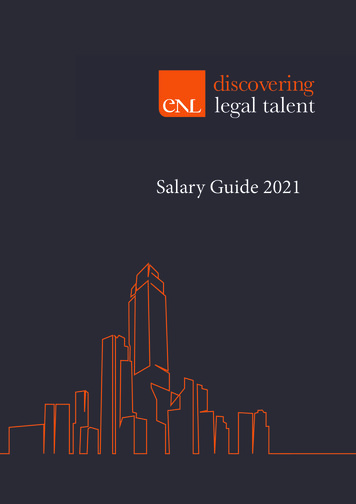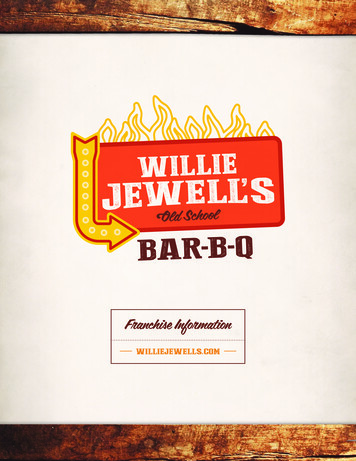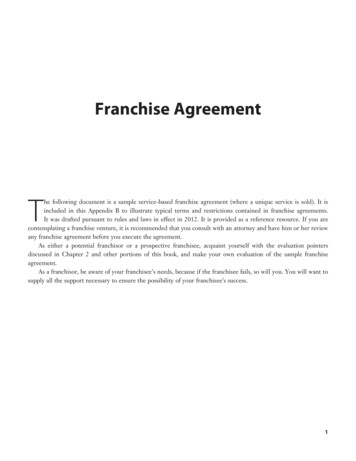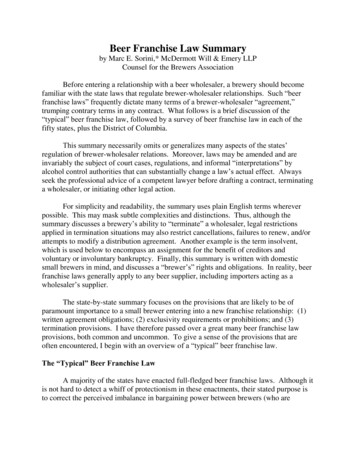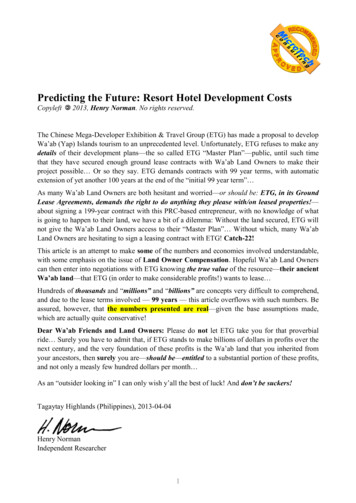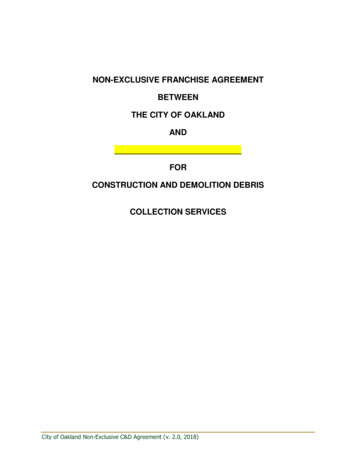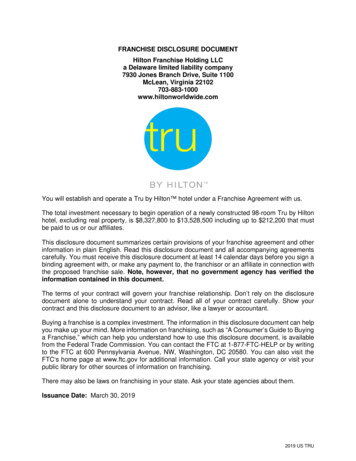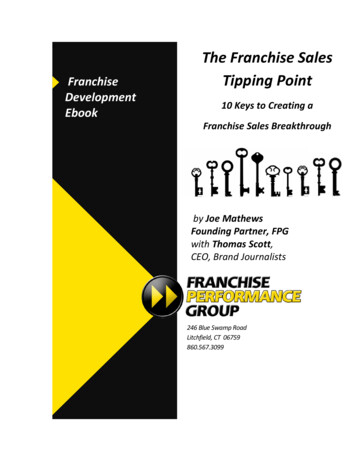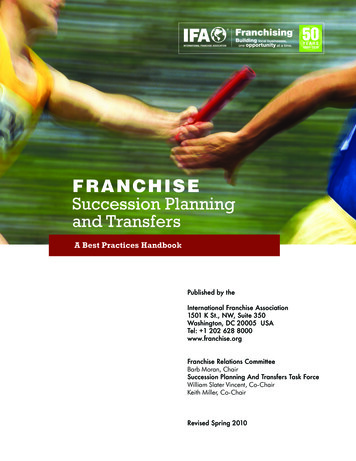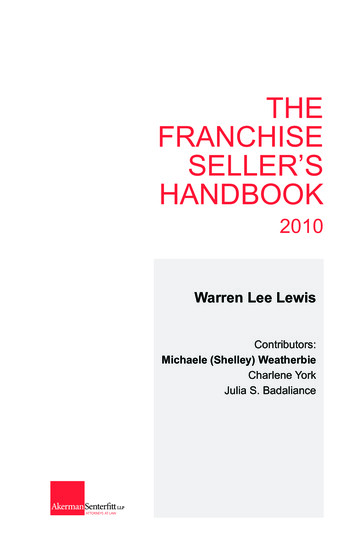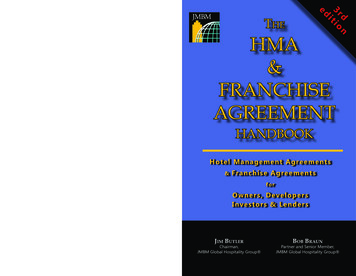
Transcription
Branded hotel management agreements continue to be very important, but theyare no longer the dominant format for branding or operating hotels in the UnitedStates. Owners and brands are placing more importance than ever on franchiseagreements, and these agreements are increasingly negotiable. This shift alsoraises issues of when to use independent operators, and the favorable terms thatmay be negotiated with them. This version of The Handbook appropriately marksthis sea change in the hotel industry.In the Foreword to The Handbook, Jan deRoos, HVS Professor of Hotel Financeand Real Estate at Cornell University’s School of Hotel Administration says, “Theauthors’ objective of providing the keys for ‘breaking the code’ to HMAs and franchise agreements is fully realized in this important work.”About the AuthorsJim Butler is the author of the Hotel Law Blog (www.HotelLawBlog.com), a founding partner of Jeffer Mangels Butler & MitchellLLP (JMBM), Chairman of JMBM’s Global Hospitality Group , andfounder and conference chairman of Meet the Money . He hasbeen quoted as an expert on hospitality issues in The New YorkTimes, The Wall Street Journal, Los Angeles Times, Forbes, BusinessWeek, TIME Magazine, USA Today, Hotel Business, and otherpublications.Bob Braun is a corporate and finance lawyer who has negotiated hundreds of hotel management and franchise agreementsfor owners, developers, investors and lenders. A partner of JefferMangels Butler & Mitchell LLP and senior member of JMBM’sGlobal Hospitality Group , Bob represents hospitality clients inboth transactional and operational issues. His articles have beenpublished in the Hotel Law Blog, Law360, Hotel-Online, Hotel NewsResource, ehotelier.com, and 4hoteliers.com.d n3r tioiDrawing on practical experience gained over more than 25 years, more than 1,000hotel management contracts and hundreds of hotel franchise agreements, JimButler and Bob Braun are hotel lawyers and veteran advisors who can help youquickly sort out what is important and what is not.The HMA & FRANCHISE AGREEMENT HANDBOOKThe HMA & Franchise Agreement Handbook is a valuable new resource forhotel owners, developers, investors and lenders. It is written in plainlanguage for business people who don’t have full-time jobs negotiatinghotel management agreements every day, but want the kind of legal and businessadvantages and insights they would get if they did.TheedTheHMA & FRANCHISE AGREEMENTHANDBOOKButler / Braun 135.00HMA&FRANCHISEAGREEMENTHANDBOOKH o tel M a nagem ent Agreem ent s&F r a nchi se Agreem ent sforO w ner s, D evel op er sI n ve stor s & Lender sJim ButlerChairman,JMBM Global Hospitality Group Bob BraunPartner and Senior Member,JMBM Global Hospitality Group
Hotel Management Agreements&Franchise AgreementsforOwners, Developers,Investors & LendersJim ButlerChairman,JMBM Global Hospitality Group andBob BraunPartner and Senior Member,JMBM Global Hospitality Group
Published by the Global Hospitality Group of JMBMLos Angeles, CaliforniaApril 20143rd edition 2011, 2012, 2014 JMBM's Global Hospitality Group .All rights reserved.1st edition, 20112nd edition, 2012We wrote the book series: The Developer’s EB-5 Handbook forEB-5 construction financing The HMA & Franchise Agreement Handbook How To Buy And Sell A Hotel Handbook The Lenders Handbook for Troubled Hotels The ADA Compliance and Defense GuideThis handbook is provided for informational purposes only.Legal advice should be based on your specific informationand provided by a qualified attorney.
Dedicated to all the owners, developers,investors and lenders who deservean even shake when they go up againstexperienced brands and operators.We hope this will help level the playing field.
What's new in theHMA & Franchise AgreementHandbook?The 3rd edition of the HMA & Franchise AgreementHandbook includes a new title, eight new articles and anew chapter to deal with the important issues raised byfranchise agreements, brands and independentoperators.The new material covers: When should you choose a brand for your hotel?When should the brand manage your hotel? The myth that franchise agreements cannot benegotiated – eight things to negotiate in your nextfranchise agreement The importance of comfort letters in financingfranchised hotels Brand franchise issues in hotel purchase and saletransactions Dual-branded hotels Beware the trap of "changing brand standards" Why all long-term hotel management agreementsare now terminable Case Study: Marriott v. Eden Roc
Table of ContentsForeword by Jan A. deRoos. viiiPreface by Jim Butler . xIntroduction . xiGetting started – terminology . xiiAbout the authors . xvCHAPTER 1 – HOW TO GET A GREAT HOTEL OPERATORMaximizing hotel value with management,branding and franchise. 2Three of the most important things you willever do for your hotel . 4The five biggest mistakes hotel owners makein selecting operators and negotiating brandHMAs. 9How to get a great hotel operator and a fairhotel management agreement . 13HMA PRO Checklist . 18How to make your HMA PRO successful –a practical guide . 22How to negotiate an HMA. 25CHAPTER 2 – WHAT YOU NEED IN YOUR HOTELMANAGEMENT AGREEMENTWhat to do before you start negotiating yourbrand HMA . 30Hotel management agreement performancestandards and why they matter . 36Hotel management agreement performancestandards – the operator's take . 40Hotel management agreement performancestandards – the Owner's Return test . 44
Table of ContentsFive keys for good HMA budget provisions . 48Indemnification provisions. 53SNDAs: Subordination agreements affect thevalue, financeability and collateral value of ahotel . 57Exculpation clauses – protecting the owner'sassets . 63CHAPTER 3 – ABOUT FRANCHISE AGREEMENTS,BRANDS & INDEPENDENT OPERATORSDecisions about brands and management. 67The myth that franchise agreements cannot benegotiated . 74The importance of comfort letters in financingfranchised hotels . 79Brand franchise issues in hotel purchase andsale transactions . 82Dual-branded hotels – what every owner ordeveloper should know . 88Five things to keep in mind when you look fora hotel operator . 91CHAPTER 4 – HOW TO TERMINATE A HOTELMANAGEMENT AGREEMENTWhy is hotel management agreement litigationon the rise? . 95Why all long-term hotel managementagreements are now terminable . 97Case Study: Marriott v. Eden Roc – what it allmeans for terminating hotel managementagreements . 100Importance of fiduciary duties in disputesbetween hotel owners and hotel operators . 107
Table of ContentsCase Study: Turnberry Isle . 110Case Study: Waikiki Edition . 115Terminating hotel management agreementswhen things don't work? . 125Terminating a hotel management agreement –where to begin . 129Epilogue . 133About HotelLawer.comThe Hotel Law BlogMeet the Money . 134
Foreword by Jan A. deRoosWhy a Practical Guide is Relevant andNeeded by the IndustryOver the years, hotel owners andhotel brands (and independentoperators) have developed important relationships based on the considerable value they provide to eachother: one provides the real property and the other the intellectualproperty that together make asuccessful hotel.Not surprisingly, a sophisticatedand legally intricate system of management agreements (HMAs) and franchise agreements hasevolved to govern how hotel owners contract with brandedmanagers or independent operators who manage, brand andhave long-term control of the hotel's assets.Fortunately, The HMA & Franchise Agreement Handbook by JimButler and Bob Braun provides an excellent and invaluable guideto understanding the important and complex arrangementscreated by HMAs and franchise agreements.The detailed discussion of HMAs and franchise agreements byButler and Braun is refreshingly direct and candid. It is writtenfor business people in easy-to-understand language. And itprovides owners, developers, investors and lenders with theunique and pragmatic counsel that only comes from intensehands-on experience with hospitality matters – particularlyHMAs and franchise agreements – representing many clientsover a long period of time.Today, the names of many hotel owners and hotel operators arerecognizable throughout the investment community. But it is notnecessarily the case that the party with the greatest marketcapitalization or success in other categories of real estate has thegreatest power in negotiating an HMA or franchise agreement.
This handbook by Butler and Braun provides essential information that will help owners, developers, investors and lendersunderstand the far-reaching impacts of their HMAs and franchise agreements, and the important points that can, and should,be negotiated.This version of The Handbook has been revised extensively toreflect a recent sea change in the hotel industry – theproliferation of franchise agreements, which have becomeincreasingly negotiable. Hotel management agreements continueto be critical for luxury properties, resorts and larger properties.But for bread-and-butter hotels and the hot select servicesegment, owners and brands are placing more importance thanever on franchise agreements. This shift also raises issues ofwhen to use independent operators, and the more favorableterms that may be negotiated with them.The authors' objective of providing the keys for "breaking thecode" to HMAs and franchise agreements is fully realized in thisimportant work. In addition, by freely distributing this work viathe Internet,* they have committed to educating a broad audience with relevant and current practice. I commend Butler andBraun for their excellent and invaluable book.Jan A. deRoosIthaca, New YorkMarch 25, 2014Jan A. deRoos is the HVS Professor of Hotel Finance and Real Estate atCornell University's School of Hotel Administration. He is co-author ofThe Negotiation and Administration of Hotel Management Contractslong considered to be the industry's leading reference on hotelmanagement agreements. The current fourth edition (2009), coauthored with James Eyster, is available at through Cornell Universityat general books@cornell.edu or (607) 255-2933.*The HMA & Franchise Agreement Handbook is availableelectronically through hotellaw.jmbm.com/hma handbook.
Preface by Jim ButlerThe HMA & Franchise Agreement Handbooktraces its roots to the Hotel Law BlogThe HMA & Franchise Agreement Handbook is drawn from articleswhich have appeared on www.HotelLawBlog.com with editsrequired to keep them current.Since the 1st edition of the handbook, hotel managementagreements or HMAs have continued to be critical to the value ofhotel assets, hotel franchise agreements have become more important than ever, and savvy investors are paying greaterattention to getting better operators and better HMAs.In this revised and updated edition, we've included a newchapter on franchise agreements, brands and independentmanagement agreements. As more brands focus on franchisingand limit their management to key strategic assets or flags, therelationships between brands, independent managers, lendersand owners has become more complicated and deserves specialconsideration. In this 3rd edition, we have also included twonew articles on why all long-term, "no-cut," branded management agreements are now terminable.All the hotel lawyers of JMBM's Global Hospitality Group joinme in hoping that The HMA & Franchise Agreement Handbook willbe useful to you and your colleagues. Please contact us with anyexperiences or thoughts you would like to share. We always loveto talk with our industry friends on "what it all means" and tosee if there is any way that our resources and experience mighthelp you accomplish your goals.Jim ButlerAuthor of www.HotelLawBlog.comFounding partner of Jeffer Mangels Butler & Mitchell LLPChairman of JMBM's Global Hospitality Group Founder and Conference Chairman, Meet the Money
IntroductionWhy your hotel project needs hotel experience .because hotels are different!Hotels are different. And so is dealing with them – whether innegotiating, litigating, or arbitrating hotel managementagreements . hotel purchase and sale, development, financingor refinancing transactions . or in workouts, bankruptcies orreceiverships. Hotels require different experience, strategies anddocumentation.The lawyers of JMBM's Global Hospitality Group are regularlysurprised to see how badly world-class lenders or investorsstumble with hotel assets. These players are often guided bysome of the "best law firms in the country" – top Wall Street lawfirms with international reputations. These legal giants may beideal for a complex real estate project or corporate finance projectbecause they have more experience in these areas than otherfirms. But hotels are NOT real estate or corporate finance, andhowever good these firms may be in other areas of law, their lackof hotel-specific experience fails them – and their clients – whenit comes to hotel transactions.We continue to see value that is irretrievably lost, due to this lackof hotel industry experience at the outset in formulating thestrategies and goals. Unfortunately, strategies and campaignslaunched on the battlefield – whether in workouts, litigation,acquisitions, or financing – are too often irreversible. Once youhave tripped past a decision point, you cannot go back!The HMA & Franchise Agreement Handbook is intended to be ahelpful resource for the friends and clients of JMBM's GlobalHospitality Group . But please listen carefully to this suggestion: If you don't have the hotel-specific experience you need foryour hotel matters, then find a way to get it! We would be gladto discuss with you how the experience we have gained overmore than 25 years and more than 71 billion of hoteltransactions might provide exactly the guidance or power youneed to get the result you want.
Getting started – terminologyHere is something of a Glossary for deciphering the coded termsused with HMAs and franchise agreements:Hotel managers and hotel operators. In the hotel industry, theprofessional companies that operate hotels are interchangeablyreferred to as hotel managers, hotel management companies,hotel operators, or hotel operating companies. These terms havethe same meaning, and for a little variety, we may use theseterms interchangeably.A hotel brand, branded management and independentoperators. A hotel brand, however, may or may not be associated with a hotel management company. For example, Marriott,Hilton, Starwood, InterContinental and many other hotel companies own the trademarked intellectual property of one or morebrand names. They can independently license the use of theirbrand name under a license or franchise agreement, or includethe right to use the name in the HMA when they manage a hotel.Hotel companies that own these trademarked brands are oftencalled "the hotel brands" or just "brands." Some of these brands,such as Choice Hotels and Best Western, only license theirbrands and do not operate hotels. Other brands which offer hotelmanagement services are often called branded operators orbranded hotel managers – and they often will manage certain oftheir brands, but not others.In contrast with branded hotel operators, a large number of hoteloperators do not own or do not license any trademarked hotelbrands to identify hotels to the public. Instead, they specialize inoperating hotels (either branded under some other company'sfranchise or unbranded). This latter group of operators withoutbrands are often called independent operators as they areindependent of the traditional hotel brands.Hotel Management Agreements (HMAs) and their ilk.Contracts between hotel owners and hotel operators controllingthe management of a hotel go by various names. They are calledhotel management agreements, HMAs, hotel managementcontracts or hotel operating agreements. For convenient refer-
ence, in this book, we will generally use the term "HotelManagement Agreement" or "HMA." Again, each of these termsmeans the same thing.HMAs allocate risk. Whatever they are called, Hotel Management Agreements allocate risk between the hotel manager andthe hotel owner. Many provisions in the HMA do this, includingreimbursement obligations, termination rights, performancestandards, indemnifications and subordination provisions. Onetype of "subordination" is an economic subordination, as where amanager agrees that all or a portion of its base or incentive feewill be subordinated (paid only after) to an owner's preferredreturn. Another type of subordination is discussed below underSNDAs.Franchise or License Agreements. When brands grant the rightto operate a property under a brand name, they do so under afranchise agreement, which is also often interchangeably referredto as a license agreement. Franchises are regulated by the FederalTrade Commission and, in many cases, registered with stateregulators and are subject to a number of disclosurerequirements substantive federal and state laws. Franchiseagreements are traditionally less negotiable than managementagreements, but as we discuss in Chapter 3, a number of veryimportant terms can be negotiated.SNDAs. SNDAs are agreements between a hotel operator andhotel mortgage lender governing the lender's right upon aforeclosure upon the hotel, including protection of the hotelmanager's right to continue to manage the hotel after foreclosure.For our purposes the following three terms are identical inmeaning and fully interchangeable in the context of hotel operating agreements: SNDA, Subordination Agreement, or Subordination, Non-Disturbance and Attornment agreement (from whichthe SNDA acronym is derived).Subordination Agreements are frequently used with varioustypes of real property when someone other than the owner isoccupying or using the property secured by the lender's loan. Soin the hotel industry, this arrangement involves the hotel owner,the hotel operator and the hotel lender. And because the lender'sjoint agreement is required, typically the HMA will specify that
these three parties will execute an SNDA (as a free standingagreement) prior to placing any lien on the hotel. The terms ofthe SNDA may be specified in the HMA, set forth in an attachedexhibit, or required to conform to the requirements of the hoteloperator.SNDAs are potentially so important that we have devoted anentire article to them, and several articles refer to them. (SeeSNDAs or Subordination Agreements affect the value, financeability,and collateral value of a hotel, page 57).Comfort Letters. Brands do not enter into SNDAs for franchisedproperties; however, they do enter into (and lenders typicallyrequire) "comfort letters," which are agreements that define therights of lenders and the brand if the owner defaults under aloan secured by a franchised hotel. These agreements can have ameaningful impact on the terms that an owner may obtain froma lender, or on a lender's rights in the event of a default.Considerable care should be given to negotiating their terms.(See The importance of Comfort Letters in financing franchised hotels,page 79.)HMAs and franchise agreements can dramatically affect thevalue, financing, operations, and marketability of a hotel.This HMA & Franchise Agreement Handbook addresses a broadrange of subjects on how to get a great operator and hotelmanagement agreement, critical terms of a hotel managementagreement, and how to terminate a bad hotel operator. It willalso cover selecting the right brand, negotiating a franchiseagreement, selecting an independent operator, and importantcomfort letter issues.
About the authorsJim Butler is one of the top hospitality lawyers in the world(Google "hotel lawyer" and you will see why).Jim is the author of the Hotel LawBlog and Chairman of the GlobalHospitality Group at JefferMangels Butler & Mitchell LLP(JMBM). For more than 25 years,Jim and his team have helped hotelowners, developers, investors andtheir lenders find business and legalsolutions with their unequaled hotelexperience gained over more than 71 billion of hotel transactions,involving more than 3,800 properties all over the world.Jim and his team are more than "just" great hotel lawyers. Theyare also hospitality consultants and business advisors who helpclients unlock and preserve value in hospitality properties.The hotel management agreement and franchise agreement areintertwined with virtually every legal and business aspect ofyour hotel. They are the keystone affecting the most crucialcomponents of your hotel's success, including financing, ownership structure, value and profitability, day-to-day operations andguest perception.JMBM's Global Hospitality Group has negotiated, renegotiated, litigated and advised on more than 1,000 hotelmanagement agreements and hundreds of franchise agreements.We have current, state-of-the-art experience in successfully negotiating with virtually every major hotel management companyand most of the independent operators.A structural pillar of our hospitality power is our dominantmanagement agreement and franchise agreement expertise.Whether it is a troubled investment or new transaction, JMBM'sGlobal Hospitality Group creates legal and business solutions
for hotel owners and lenders. They are deal makers. They canhelp find the right operator or capital provider. They know whoto call and how to reach them.Jim Butlerjbutler@jmbm.com310.201.3526Bob Braun is a transactional lawyer who has negotiatedhundreds of hotel management, franchise and license agreements for owners, developers, investors and lenders. A seniormember of the Global Hospitality Group at Jeffer MangelsButler & Mitchell LLP, Bob represents hospitality clients in bothtransactional and operational issues.On a domestic and internationalbasis, he is experienced in negotiating hotel management and franchise agreements, the purchase andsale of hotels, resorts, restaurantsand other hospitality properties,providing counsel for a wide rangeof strategic and operational issues,and helping clients with troubledassets.The agreements between the owner,brand and manager affect virtually every aspect of the hotel orresort property, and Bob brings to the negotiating table a wealthof experience in hotel transactions and a deep understanding ofthe day-to-day operating issues of hotels and resorts, and relatedoperations such as spas, restaurants, retail, residential components, golf courses and more).Bob's recent experience includes negotiating the managementagreement for a number of dual-branded luxury, upper upscale,upscale and extended stay properties; representing a client in themanagement and branding of an iconic, adaptive reuse development; negotiating a management agreement for a mixed-useoffice, retail and ultra-luxury hotel property in a major metropol-
itan area; and facilitating the acquisition and branding of a seriesof hotels acquired by a lender in foreclosure. Bob has handled atransfer of management for a portfolio of 27 hotels to six separatemanagement companies (and negotiated the related franchiseagreements); represented the acquisition and assembly of aportfolio of 10 full-service and select-service hotels by aninternationally recognized private equity group; and has overseen dozens of friendly and hostile transfers of brands andmanagement of distressed hotel properties. Bob frequentlyadvises clients on operational issues such as telecommunications,software, internet, e-commerce, data processing and outsourcingagreements, and counsels hospitality clients on national andinternational data security and information technology matters,particularly the mitigation of damages from data breaches andprivacy violations.Bob and JMBM's Global Hospitality team have decades of experience in helping owners preserve and enhance the value of theirhotel properties through hotel management and franchiseagreements. They are advocates who can level the playing fieldbetween hotel owners and hotel brands.More than just great lawyers, the members of the GlobalHospitality Group are deal makers who bring solutions toevery situation.Bob Braunrbraun@jmbm.com310.785.5331
CHAPTER 1HOW TOGET A GREATHOTEL OPERATOR
Maximizing hotel value withmanagement, branding and franchiseImagine this: You are getting ready to start one of the mostimportant processes in your hotel's "life cycle" – selecting thehotel brand and operator and getting them under contract. Evenif you are a major hotel owner or developer, how manymanagement or franchise agreements do you do a year? Two?Five? Ten? And with how many brands?Or, maybe you are a very experienced real estate developer orinvestor, but you haven't done many hotel deals, and don't wantto fall into the traps some other smart real estate investors havewhen they failed to realize that hotels are different. You need toknow (or have a guide to) the players, the norms and customs,and the practices of the hotel industry. How can you do that?With JMBM, no one will make a fool of you. Our experience willhelp you confidently establish what "market" is on managementor franchise agreement terms. We will help you strike a gooddeal and a fair one.What if you could make one phone call to solve your problem?One phone call to instantly tap into these resources:The "little black book" of hotel industry contacts of ahotel industry insider, complete with relationships andcredibility built over more than 25 years.A virtual data base of terms and deal points gatheredover more than a thousand transactions with virtuallyevery brand and operator so you know when you aregetting "market" terms.Top business advisory and legal guidance and protection at every step.These are precisely the resources you can access with thehospitality attorneys of JMBM's Global Hospitality Group . Wehave negotiated, re-negotiated, litigated and advised on morethan 1,000 hotel management agreements and hundreds offranchise agreements.
Hotel management and franchise agreements are intertwinedwith virtually every legal and business aspect of your hotel. Theyare the keystone affecting the most crucial components of yourhotel's success, including financing, ownership structure, valueand profitability, day-to-day operations and guest perception.In fact, a branding and management agreement can easily createmore than a 50 percent swing in the value of the hotel – andoften much more! And, a long-term management or franchiseagreement is difficult to "fix" once it is in place.We can help you develop your own list of deal point prioritiesthat you "must have," "want to have" and "would like to have."These may include a host of critical items, such as: performanceclauses, termination rights, ramping up management fees, ownerapproval rights over operating and CapEx budgets, preferredreturns for owners, and subordinated incentive fees for operators.JMBM's Global Hospitality Group has successfully negotiatedwith virtually every major hotel management company andbrand. Our vast experience helps create value for your project.
Three of the most important thingsyou will ever do for your hotelThree of the most important things you will ever do for yourhotel are selecting the right hotel brand, selecting the rightoperator, and negotiating a fair Franchise Agreement and/orHotel Management Agreement.At one time, virtually all of the upscale hotel brands were onlyavailable with a hotel management agreement. In this model, thehotel company grants the hotel the right to use its brand as partof the HMA that also gives the hotel company the sole andexclusive power to manage the hotel for a period of many years.There is no franchise or license agreement. In this arrangement,when you select the brand, you have selected the operatorbecause there is a unity of brand and brand management.Although the power of the brand and effectiveness of operationsare still separate considerations, ultimately the selection of onedetermine
proliferation of franchise agreements, which have become increasingly negotiable. Hotel management agreements continue to be critical for luxury properties, resorts and larger properties. But for bread-and-butter hotels and the hot select service segment, owners and brands are placing more importance than ever on franchise agreements.
